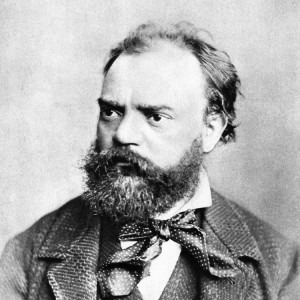
Antonín Dvořák
Actually, hero’s stories set to music were not new, but in 1897, this was an idea that seem to take root. We can see it anticipating Richard Strauss’ contribution to the genre in 1898: Ein Heldenleben. Dvořák didn’t lay out his story in the detail that Strauss did but did give a general idea in a letter he wrote sometime later: The hero is eager to set out and conquer the world only to be set back by an incident that grieves him deeply. In his sorrow, he finds a new hope, seeks consolation in nature, and regains his former spirit. He goes on from strength to strength and as we can so clearly hear at the end, it all ends in triumph.
The beginning, in the low strings and brash horns, gives us the motif for our unnamed hero. The whole first section sets out our hero’s character: brash, impetuous, yet with a few thoughts of self-preservation. All of this is in a tempo that reflects that character as well: Allegro con fuoco, a true fiery Allegro. The tempo change to Poco adagio lacrimoso (somewhat slow and weepy), signalled by low clarinet sounds (02:29) is his unknown (to us) grief, with a funeral march. Throughout the piece, it is these changes of tempo that signal the inner thoughts of our hero. Dvořák doesn’t tell us what these changes mean – it’s up to the listener to imagine what the hero is doing in his darkest hours and how he moves into the light (and the major keys) as he comes to victory.
Unlike Strauss, however, who tells you every detail of his life in his music, Dvořák is much more circumspect. We ‘know’ that Strauss imagined himself as a hero but we’re less sure of Dvořák’s own thoughts on himself as hero. What we can hear, however, is that Dvořák could imagine a hero’s life – it has to end positively or else he’s not a hero, is he?
In many ways, this is really a hero’s farewell. This was the last of Dvořák’s symphonic poems, his last orchestral piece, and, in fact, his last purely instrumental work. The next few years saw him devoting his time to opera and vocal works. So, listen to it with an eye toward mortality but with an ear towards the immortality that Dvořák achieved.
Dvořák: A Hero’s Song, Op. 111 (Royal Scottish National Orchestra; Neeme Järvi, cond.)

